A Dawn of Mammals Collection Read online
Page 9
“Like the dinosaurs with wings made it,” Bob said. “And the ones without didn’t. The ones with wings, we call birds. But they’re dinosaurs, really.”
“Are we going to go extinct?” That was Laina. “Humans, I mean.”
“Absolutely,” said M.J. “The average mammal species gets about a million years. Then poof. The oreodonts had a long run, thirty or forty million years, but that’s not all one species. Rabbits have lasted, hardly changed, for nearly that long. Horses have been around since before the time we’re in now, though in that case, they’ve changed so much, you might not guess an Oligocene horse is a horse when you see it.”
“Have we seen horses here?” Hannah asked him. “Today?”
“I haven’t. Not yet. But they’re here, assuming we’re in the same general area where we left the modern world. We know about horses here from fossil bones. Three-toed, no bigger than a medium-sized dog, like an Australian Shepherd. And not at all the same kind of head or neck as a race horse. So if you caught sight of one, you probably wouldn’t think ‘horse’ off the top of your head.”
Hannah’s empty stomach twisted, and she wondered how roasted miniature horse might taste. As the others went on talking, she worried again about food. Tomorrow, they needed to move on and find a permanent camp and get it set up. More fuel-collecting, which would be a job that needed to be done every single day. And then she needed to buckle down and start on nets for fish and fowl, digging pit traps, and fashioning snares. She’d figure out who had the most engineering talent among them and set that person to devising clever ways to build a trap. She needed to check with Ted, to see if his athleticism extended to javelin-throwing. Maybe he would be able to spear one of the oreodonts. Send out three of them, have two try to cut an animal from the herd, drive it toward Ted, let him take his best shot.
So much to do, to teach, to learn—and all before they starved to death. A handful of grass at every meal would not keep them alive. Her mind went to the pemmican bar in her backpack. She wanted it, but someone would want it more later.
A lull in the conversation had come. Rex’s voice broke the silence. “The stars are coming out. And the planets. I think that white one is Venus.”
Until they fell asleep, the kids entertained themselves by naming constellations. The Beamer. The Twinkie. Lady Gaga’s Hat.
Hannah bedded down next to Jodi. The girl had a restless night, and so Hannah did too. There was nothing she could do to ease Jodi’s pain, and losing sleep was a small enough punishment for her failure to protect them. Jodi was being punished too, and that just wasn’t fair.
The stockade or the fire did their jobs, and no predator troubled them at night. But near dawn, far off, she heard a shriek of an animal in pain. Then, silence. She suspected the saber tooth had made a kill.
Chapter 20
“We need a system. Habits,” she said to Bob the next morning, as the two of them waited for the students to sleep themselves out. “Don’t you think?”
“I don’t know what to think. Funny, I always imagined myself a fairly bright guy,” he said. “But my mind has still not caught up to the reality.” He cocked his head and studied her. “But yours has.”
“Probably because I’m not as smart as most of you,” she said. “It’s easy for me to be practical because my imagination isn’t as active.”
“Pfft,” he said. “You’re no dullard.”
“I’m no M.J.”
“Not many are,” he said. “I thought he was exceptional, but he introduced me to another paleontologist or two over the years, and it seems to be part of who they are. Focused, amazing retention of detail, excellent thinkers.”
“We need all sorts of skills to survive. Even a slower person like me can be useful. Tell me about the kids. One by one, summarize their personalities.”
“Maybe we should walk away to do that.”
“Okay, but let’s keep our eyes out. Daytime predators must just be going on their first hunt of the day.”
They walked from the group as Bob told her about his students. “Dixie, as you may have guessed, is probably the least intelligent of the group. She works at it.”
“At school, you mean? To keep up?”
“No, she works at staying dumber than she is. Hormones, you know. Smart girls put off some boys.”
“Still? In this day and age?”
“The more things change,” he said. “And Nari wants to be Dixie, but she isn’t as good at squashing down her own intelligence. And while I’m talking about Dixie, have you noticed Garreth’s crush on her?”
“No.” She was surprised. “He seems like such a nice kid.”
“Oh, he is. And Dixie notices it even less than you did. Rex, of course, very bright, and very motivated in astronomy. He hero-worshipped Neil deGrasse Tyson his whole life, but as he’s maturing, he’s getting more interested in research and less in being a TV star. His weaknesses are more social than intellectual. He can be aloof.”
“And I noticed he likes to answer every question. Sometimes other kids hate that.”
“Not in the advanced science class so much, but yes, in other classes, that’s probably a problem for him.”
They continued walking, in a circle around their camp, and talking. Hannah stopped every so often to examine a new plant. After they’d done their “personnel review,” as she realized it was, they went back to find nearly everyone awake.
Hannah checked Jodi. No fever. She was alert and swore she was feeling better. They’d passed the first crisis with her, but the possibility of infection was the next hurdle.
“Should we dismantle the stockade?” asked Garreth.
“No, leave it,” she said. “If we need a quick shelter while we’re foraging or hunting, here it is, another place to run to.”
Garreth glanced at Jodi, no doubt thinking he didn’t want to end up in her condition. “Yeah. Okay. Good idea.”
In food testing, she was to the point of eating a bite of her tuber. She reminded Zach to rub the onion on his lip. By the end of the day, she might have three different edibles identified. Tomorrow, everyone could collect all they could find of all three of them, and they might get one decent meal.
One meal every three days—even one per day of onions and grass—was not going to suffice. Meat was going to be the answer to the food problem.
Mid-morning, they found the source of the stream. It was a spring, as she had guessed. She expected M.J. to explain why springs happened, what the rock layers would be, and fall into lecture mode again, but then she realized he had been quiet all morning. Maybe the seriousness of their situation was finally dawning on him.
It was dawning on the teenagers, that was certain. Hunger wasn’t improving their moods, either, but she heard more than one conversation about home. “And we aren’t even checking the cave,” Claire said. “What if it opens up once a day, and we’re not there to see it?
Good point, actually. She wished they could be in both places at once. She didn’t want to split up the group—not yet—but once they had solved the basic survival problems, that might be the best idea. Set a trio of people on “timegate watch” every day.
An attack of diarrhea hit her soon after they stopped. When she came back from dealing with it, she asked if anyone else had a digestive upset. No one did. She feared it was the tuber. She’d try it one last time, once the diarrhea had passed, by cooking it first. If that didn’t work either, then she’d eliminated one possible food source. Zach seemed to be tolerating the onion fine, though. She told him to wait about another hour, then chew some and spit it out.
Onions and grass would not keep them alive. She needed to organize them into hunting or trapping parties. But first, they needed shelter. In other words, they needed to protect themselves from being prey before they worried about becoming predators.
Last night, more than one of them had suffered insect bites at dusk, and she said, “We can build a shelter away from the spring, maybe get ourselves bug-bit m
arginally less.”
Everyone was out of sorts. M.J., who agreed to keep watch over an exhausted Jodi near the spring, had lost his natural charm, and sat looking morose, staring off into the distance.
“M.J.,” she said, as she prepared herself to go. She had to say his name twice before he looked at her. “Are you okay?”
He nodded.
She had a sudden fear he’d poisoned himself. “Did you eat something? On your own?”
Chapter 21
He shook his head.
“M.J.” She sharpened her voice. “Are you capable of watching out for Jodi?”
His back straightened a little at that. “Yeah.”
Feeling less than entirely comfortable leaving him as lookout, she took her four kids off while Bob took the other four. Her group scouted sites for an hour, saw nothing, and turned around. There was no natural shelter, no cave, or overhang, or cliff to put at their backs.
They met back by M.J. and Jodi, who seemed okay. She had left Jodi the needle to repair her shirt, which had been ripped by the nimravid’s claws. Jodi returned the needle, and Hannah carefully tucked it into the first aid kit.
What was wrong with M.J., she had no idea, and she didn’t have the time to fool with him.
Bob’s group came back having had no more luck than hers. He said, “We can sleep at the stockade tonight.”
“We can,” she said. “And we should, I think. But after that? I’m going to say you were right all along and that we should make the cave our home. I’m sorry. I got that wrong.”
“But we’ll have to walk an hour to get water every time we want a drink,” said Jodi.
If it weren’t for the girl’s injuries, Hannah would march them straight back to the cave right now.
M.J. said, “Animals live in caves.”
“Did you see any sign one was in that cave? Droppings? Nests?”
He shook his head.
“We’ll keep an eye out. Maybe something lives there. We’ll keep a fire burning by the entrance all night.” She clapped her hands and tried to sound enthusiastic. “Okay, people. Let’s walk back to the stockade for tonight, and we’ll break into groups of plant-gathering, fuel-gathering, and net-making.”
Jodi said, “I can help with the nets, can’t I?”
“You bet,” Bob said. “Good attitude.”
Hannah wanted Claire and Ted with her. Not a single one of these kids was a hunter, she had found out, but Claire had secondhand knowledge, and Ted had the hand-eye coordination. Somehow, they were going to figure out a way to bring down game, and within a day or two. Without calories coming in, they’d get steadily weaker, and soon they’d become too confused to catch anything.
The kids were tired, and there was little talk on the way back to the stockade. Their speed was limited by Jodi, who was the weakest member of their herd for now. She kept the girl in the middle, so that predators wouldn’t see her—or smell her—and have the same thought.
At the stockade, she set Rex, Dixie, and Jodi to making more cordage. She divided up the remainder of the teens between M.J. and Bob. “Remember, stay close together this time, and one person always should be keeping an eye out. On every three-person team, two work, one watches.
Bob echoed her. “At all times, guys. Switch off, so you don’t become complacent.” He glanced around and said, “Too relaxed, I mean. Stay alert.”
Hannah realized he was doing an attentive teacher-thing, looking into faces for lack of comprehension, and then redefining a word he saw someone hadn’t understood. She’d have to remember to do that herself. It was human nature to pretend to understand instructions you had not. It was probably even more the nature of teenagers.
The nine of them walked downstream. The food-gatherers stopped first, spotting a patch of onions. Her hunters, she stopped outside the same patch of trees where she’d missed when hurling rocks at the squirrels. The dung-gatherers went on to the more plentiful fields to collect fuel.
She turned to Claire. “Has your father hunted small game?”
“A little,” she said. “He talked about doing that as a kid, but now his favorite hunting is antelope. He hunted for small birds sometimes. Like squab and quail. They both taste okay.”
“But he used a rifle.”
“Or shotgun, maybe?”
“What have you picked up about his hunting? How much does he move? How long does he sit and wait for something to come by? How much good does staying upwind do him?”
Claire brightened as she realized she did know something of these answers, and began talking.
“You getting all this, Ted?”
“I’m listening.”
When Claire was talked out, Hannah said, “Eventually, I want us to fashion spears to hunt bigger game. We can encircle them, drive them toward our best spearman—who I suspect will be you, Ted—and then you can make the kill. Can you? Could you stab an oreodont to death?”
“I’m so hungry, I could stab anything to death.”
Claire said, “Then I’m staying away from you.” They smiled at each other.
Hannah was happy to see a spark of good humor. “Great. But for today, I want you to do something even harder. You play baseball, right?”
“Third base. I wish I was playing right now.”
“You can. You get to be the left fielder. And there’s a runner coming into home, and you have to throw him out, hard and accurate.”
“So the animal is the catcher’s mitt I’m aiming for.”
“Exactly right. With a rock.”
Chapter 22
Claire said, “There are boomerangs too. In Australia.”
“That might work,, some sort of dense wood stick,” she agreed. “It doesn’t have to come back to you, just hit the thing.”
Claire said, “What do we do? You and me, I mean?”
“Hang out nearby, real quiet, and if he knocks something off a tree but doesn’t kill it, we need to rush in and grab it before it gets itself together to run away.”
“I’m not the fastest runner,” she said, doubt in her voice.
“Once we’re all feeding ourselves better, we can all start training for sprinting.”
“I know how to do that,” said Ted. “To teach people to run faster.”
“Great, you get to be the personal trainer later on. For now, let’s try and get something to eat.”
After they had gathered some rocks for ammunition, she made them all be quiet and sit still, each facing a different direction. She didn’t want something to sneak up on them while they were waiting to sneak up on something else. The copse of trees started coming alive again once they had been silent for ten minutes. A bird whooped. A rodent made a coughing sound.
She pointed to Ted and sent him around to the right, away from the stream. Claire, she had move straight ahead. She was going to circle around to the left, to the stream itself and then back up the bank into the trees. She put her finger to her lips and then mouthed the word “Slow.” They both nodded.
Ted loaded his pockets with rocks and they split up. The two kids kept looking to her to set the pace, and she kept it slow, avoiding brittle twigs and dried leaves. She quit thinking about the others and fell into a near-hypnosis, moving forward a couple steps, pausing, looking at her next foot placement. After five minutes, she realized she had forgotten all about predators again—damn, it was easy to forget! She swiveled her head and looked all around, but they seemed to be safe for now.
They snuck up on the copse of trees. Once, one of the kids must have stepped on a twig, for a loud snap came through the trees, and the sounds from the animals went still. She waited until they began making normal noises again before moving forward. When she came up on a big tree, she stayed behind the wide trunk, her back to the stream, and motioned to Claire to do the same. Now it was all up to Ted. Either he’d bring down game, or they’d go hungry again tonight.
Ted was moving cautiously. He slid in and out of her sight as he crept through the copse, homing i
n, apparently, on something he could see but she couldn’t. As he moved forward, his knees bent, his back tense, it struck her that they all had this in them. Hundreds of thousands of years of evolution had made them hunters—and hunters who could throw a rock, or a spear, or a weighted net. They were made for this, as the oreodonts were made for grazing, as the saber tooth was a fast and efficient killing machine.
She had the sense that if they could all shrug off the trappings of civilization, they could ease into these skills. Knowing it to be nonsense, knowing that every skill they learned would be hard-won, she could not shake the idea that by becoming hunter-gatherers, they were somehow becoming more human.
Ted threw so fast, she almost missed seeing the movement. She heard him whisper a curse. He looked to her, disappointed. She patted the air, trying to reassure him. Keep trying, she mouthed, and she doubted he understood it, but he got the gist. He went still and waited for the animals to start making noise again before moving another step.
Twice more, he threw and missed. She was stiffening up—oh, to be sixteen again and less creaky—when instead of a rock hitting a tree limb, she clearly heard it strike flesh. She looked to the noise and saw a squirrel plummet almost twenty feet through the air.
Before it landed, she was running for it. So was Ted. Claire brought up the rear.
The animal was still alive, twitching. Hannah scooped it up and twisted its head, meaning to break the neck. In her enthusiasm, she twisted it clean off.
“Eww, gross,” Ted said, but not as if he really minded. Claire came up, breathing hard, and paled a little at the sight of the head in one of Hannah’s hands, and the bleeding body in the other.

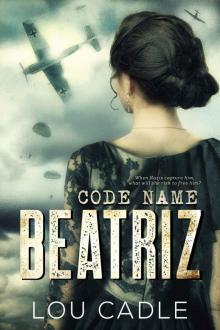 Code Name- Beatriz
Code Name- Beatriz Oil Apocalypse Collection
Oil Apocalypse Collection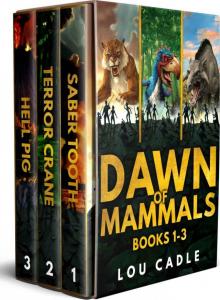 A Dawn of Mammals Collection
A Dawn of Mammals Collection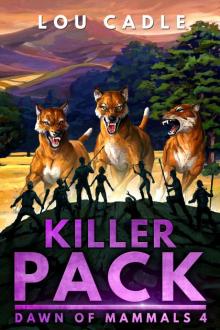 Killer Pack (Dawn of Mammals Book 4)
Killer Pack (Dawn of Mammals Book 4)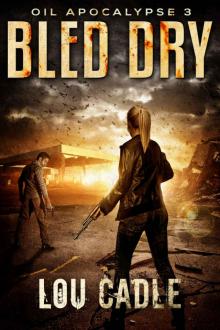 Bled Dry
Bled Dry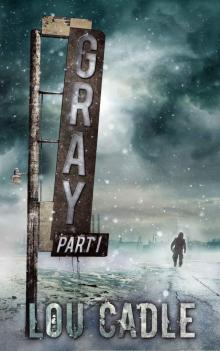 Gray (Book 1)
Gray (Book 1) Dawn of Mammals (Book 4): Killer Pack
Dawn of Mammals (Book 4): Killer Pack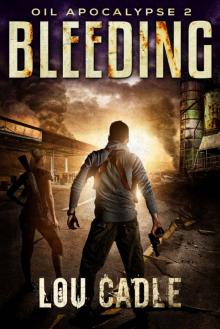 Bleeding (Oil Apocalypse Book 2)
Bleeding (Oil Apocalypse Book 2)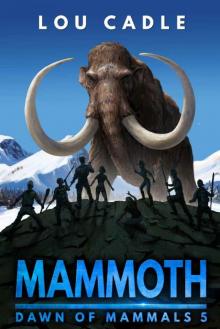 Dawn of Mammals (Book 5): Mammoth
Dawn of Mammals (Book 5): Mammoth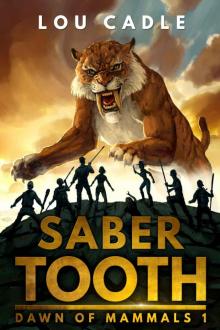 Saber Tooth (Dawn of Mammals Book 1)
Saber Tooth (Dawn of Mammals Book 1)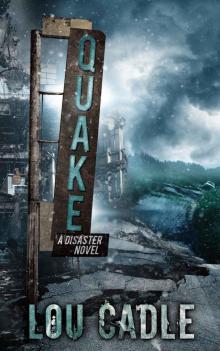 Natural Disaster (Book 2): Quake
Natural Disaster (Book 2): Quake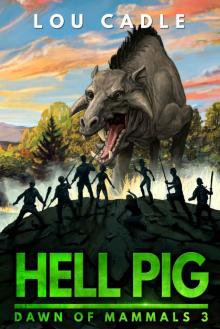 Hell Pig (Dawn of Mammals Book 3)
Hell Pig (Dawn of Mammals Book 3)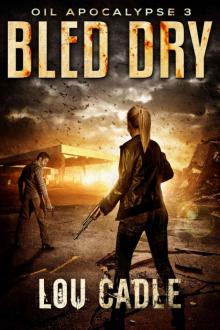 Bled Dry (Oil Apocalypse Book 3)
Bled Dry (Oil Apocalypse Book 3)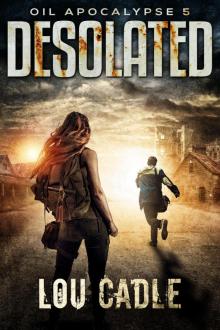 Desolated
Desolated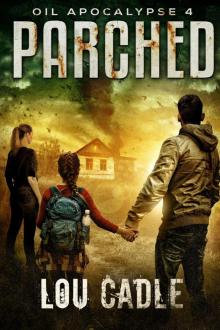 Parched
Parched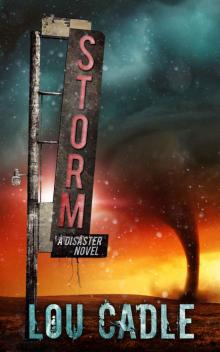 Natural Disaster (Book 3): Storm
Natural Disaster (Book 3): Storm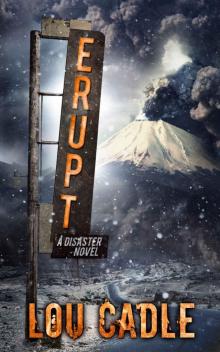 Natural Disaster (Book 1): Erupt
Natural Disaster (Book 1): Erupt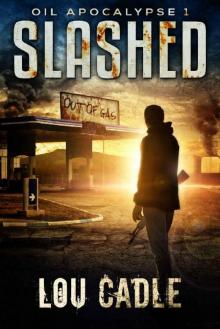 Slashed (Oil Apocalypse Book 1)
Slashed (Oil Apocalypse Book 1)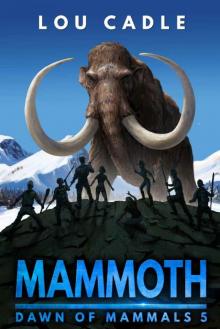 Mammoth (Dawn of Mammals Book 5)
Mammoth (Dawn of Mammals Book 5)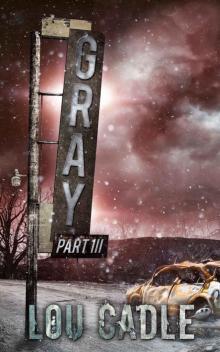 Gray (Book 3)
Gray (Book 3)